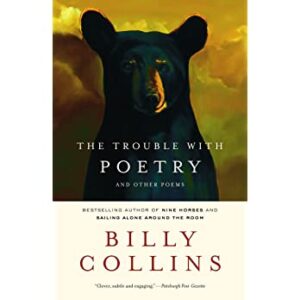 This week in the WSJ, Billy Collins, a former United States Poet Laureate, writes about his writing process and the history of poetry.
This week in the WSJ, Billy Collins, a former United States Poet Laureate, writes about his writing process and the history of poetry.
“In 19th century English poetry, inspiration became a kind of pathology. There were metaphors for inspiration like flames, sparks and fountains. The trouble with the word inspiration in this context is that it suggests passivity—writers are people who write, but fall prey to this theory of inspiration, you’re not acting, you’re waiting.
What I need is an initiating line. It’s a seductive technique to get the reader’s attention and to give the reader something very easy to accept, something a reader can’t deny. Then the poem goes forward. Waiting for inspiration is a way of ennobling procrastination. The trail of poets that have preceded you and affected your writing, those are my inspirations.
You’re never alone when you write. YOUR PAGE IS LIT BY THE CANDLES OF THE PAST.” (caps are mine)
Two of my favorite Billy Collins poems…
YOU, READER
I wonder how you are going to feel when you find out that I wrote this instead of you.
that it was I who got up early to sit in the kitchen and mention with a pen the rain-soaked windows, the ivy wallpaper, and the goldfish circling in its bowl.
Go ahead and turn aside. bite your lip and tear out the page, but, listen–it was just a matter of time.
before one of us happened to notice the unlit candles and the clock humming on the wall.
Plus, nothing happened that morning–a song the the radio, a car whistling along the road outside–
and I was only thinking about the shakers of salt and pepper that were standing side by side on a place mat.
I wondered if they had become friends after all these years
or if they were still strangers to one another
like you and I who manage to be known and unknown to each other at the same time —
me at this table with bowl of pears, you leaning in a doorway somewhere
near some blue hydrangeas reading this.
THE LANYARD
The other day I was ricocheting slowly off the pale blue walls of this room, bouncing from my typewriter to piano, from bookshelf to an envelope lying on the floor.
I found myself in the L section of the dictionary where my eyes fell upon the word lanyard.
No cookie nibbled by a French novelist could send one more suddenly into the past–a past where I sat at a workbench at a camp by the deep Adirondack lake
learning how to braid thin plastic strips into a lanyard, a gift for my mother.
I had never seen anyone use a lanyard or wear one, if that’s what you did with them, but that did not keep me from crossing strand over strand again and again
until I had made a boxy red and white lanyard for my mother.
She gave me life and milk from her breasts, and I gave her a lanyard. She nursed me in many a sickroom, lifted teaspoons of medicine to my lips,
set cold face-cloths on my forehead, and then led me out into the airy light and taught me to walk and swim, and I, in turn, presented her with a lanyard.
Here are thousands of meals, she said, and here is clothing and a good education. And here is your lanyard, I replied, which I made with the help of a counselor.
Here is a breathing body and breathing heart, strong legs, bones and teeth, and two clear eyes to read the world, she whispered, and here, I said, is the lanyard I made at camp. And here, I wish to say to her now, is a smaller gift–not the archaic truth that you can never repay your mother, but the rueful admission
that when she took the two-toned lanyard from my hands, I was as sure as a boy could be that this useless, worthless thing I wove out of boredom would be enough to make us even.
Please share you thoughts…thanks for reading.

6 Responses
I especially love the poem about the mother and the lanyard. Most of us mothers are happy to give everything to our children. Whatever little handmade gift in return is accepted with open arms.
That is such good advice about not waiting around for inspiration. And a great example in the “You, Reader” poem. I didn’t write a poem this morning, but I did write a scene and that’s great for me!
Awesome. I know the feeling. The computer pulls me there and once I’m writing, it is hard to get me away.
Hi Joyce,
Love your comment. Bravo, that you wrote a scene. For me it used to be getting myself in the chair, but once a story is flowing you cannot wait to get back to it. Admire that you write poetry. BRAVO! Beth
Awesome, Joy. Thanks for your comment, it means a lot. Writers stick together, Beth
Thanks, Laurie. My English professor brother introduced us to Collins and as a family we read two of his books.
This poem is a favorite, Beth